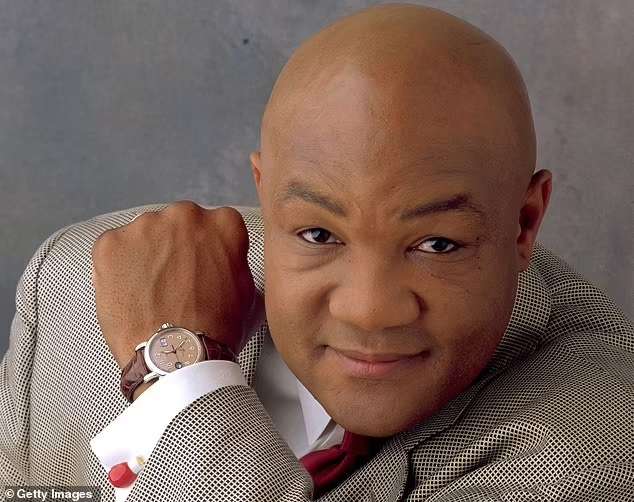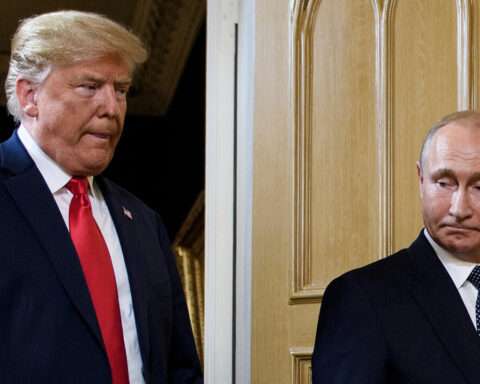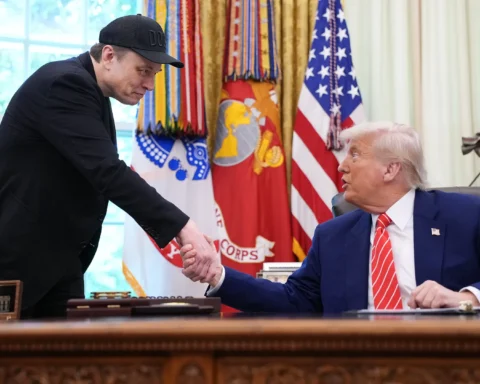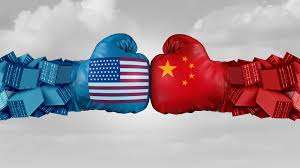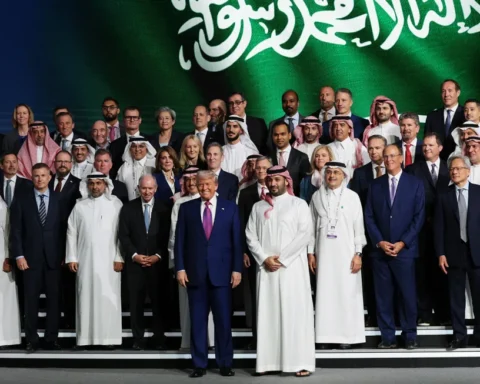When news broke of George Foreman’s death at age 76, President Donald Trump was quick to react, calling him a “great fighter” and a remarkable person whose impact stretched far beyond the boxing ring. Foreman, a two-time heavyweight champion and Olympic gold medalist, passed away on March 21, 2025, surrounded by loved ones, prompting an outpouring of tributes from sports legends, politicians, and fans alike.
Trump’s heartfelt response on Truth Social highlighted Foreman’s legendary punching power—rivaled only by Muhammad Ali—and his larger-than-life personality, cementing the boxer’s place as a cultural icon. This article explores Trump’s reaction, Foreman’s extraordinary legacy, and the broader resonance of his death across the globe.
It’s March 22, 2025, and the world is still processing the loss of Foreman, whose family announced his passing via Instagram late Friday night. Trump’s post, shared just hours before his scheduled appearance at the NCAA Division I wrestling championships in Philadelphia, struck a personal note: “I knew him well, and he will be missed.” The president’s words reflect a decades-long connection with Foreman, forged through boxing events at Trump’s Atlantic City venues in the 1990s. As tributes pour in, Trump’s reaction underscores the intersection of sports, politics, and personal ties that defined Foreman’s life.
A Champion’s Journey: From Ring to Legacy
George Foreman’s career was a testament to resilience and reinvention. Born in Marshall, Texas, in 1949, he rose from a troubled youth to win Olympic gold in 1968, famously waving an American flag in Mexico City—a patriotic act that stood in contrast to the Black Power salute of Tommie Smith and John Carlos days earlier, as noted by CNN. Foreman turned pro, claiming the heavyweight title in 1973 with a brutal knockout of Joe Frazier, only to lose it to Ali in the 1974 “Rumble in the Jungle.” The BBC recalls how Foreman’s defeat in Zaire—where Ali’s “rope-a-dope” strategy wore him down—marked a turning point, leading to his first retirement in 1977 after a spiritual awakening.

Foreman’s comeback in 1987 defied the odds. At 45, he stunned the boxing world by knocking out Michael Moorer in 1994 to reclaim the heavyweight crown, becoming the oldest champion in history, a feat chronicled by The New York Times. With a record of 76 wins, 68 by knockout, and just 5 losses, Foreman’s power was undeniable. Beyond the ring, his George Foreman Grill—selling over 100 million units—transformed him into a household name, as Fox News highlights. Trump’s tribute zeroes in on this duality: a fearsome fighter who became a beloved entrepreneur and preacher.
Trump’s Ties to Foreman: A Personal Connection
Trump’s reaction to Foreman’s death wasn’t just a formality—it was personal. The two crossed paths frequently in the 1990s, when Trump’s Atlantic City casinos hosted major boxing events. NBC News recalls the 1991 Foreman-Holyfield fight at Trump Plaza, where Trump and then-wife Marla Maples watched Foreman lose a unanimous decision to Evander Holyfield. Another iconic moment came in 1997, when Trump posed with Foreman and Shannon Briggs in Times Square to promote a fight, a photo that resurfaced online after Foreman’s passing, per Hindustan Times. These encounters built a bond, with Foreman later praising Trump’s support for boxing.
In a 2016 Independent interview, Foreman endorsed Trump’s presidential run, calling him a friend to the sport and predicting he’d bring “fun” to politics. Trump’s Truth Social post reflects this mutual respect: “He was something really Special, but above all, he was a Great Person, with a personality that was bigger than life.” Fox News notes that Trump’s condolence message—offering “warmest condolences to his wonderful family”—came amid a busy schedule, underscoring the significance he placed on honoring Foreman.
Trump Reacts to ‘Great Fighter’ George Foreman’s Death
Trump’s full reaction on Truth Social captures the essence of Foreman’s legacy: “George Foreman is dead. What a GREAT FIGHTER!!! He had, without question, the heaviest and biggest punch in the history of boxing. With the exception of Ali, when you got hit, you went down.” This vivid imagery, reported by CNN, aligns with boxing lore—Foreman’s punches were so devastating that even Ali, in their famous bout, had to outsmart rather than outmuscle him. Trump’s emphasis on Foreman’s physical prowess echoes sentiments from peers like Mike Tyson, who told NBC News, “His contribution to boxing and beyond will never be forgotten.”
The timing of Trump’s post, just before his Philadelphia trip, suggests a deliberate pause to reflect on Foreman’s impact. The New York Times notes that Trump’s words joined a chorus of tributes, yet stood out for their personal tone. “I knew him well,” Trump wrote, a claim rooted in their shared history at ringside and beyond. This subheading mirrors the article’s title, reinforcing Trump’s emotional response as a lens into Foreman’s enduring influence.
The World Mourns: Tributes Pour In
Foreman’s death reverberated far beyond Trump’s orbit. The BBC reports that Mike Tyson and Texas Governor Greg Abbott were among the first to pay respects, with Abbott calling him “a legend lost.” Houston Mayor John Whitmire praised Foreman’s community ties, telling NBC News, “We knew him as a proud member of our community—a man whose heart was as big as his powerful punch.” ESPN’s Jeremy Schaap argued Foreman crafted “the greatest second act in sports history,” a view echoed by Charles Barkley, who told Reuters he admired Foreman’s gentleness outside the ring.
Social media amplified the grief. William Shatner, Foreman’s co-star on “Better Late Than Never,” expressed sorrow, while Magic Johnson tweeted about buying one of the first Foreman Grills, per Fox News. The Ring magazine dubbed him “one of the greatest heavyweights of all time,” a sentiment Trump’s tribute implicitly endorses. Foreman’s family, in their Instagram statement, emphasized his faith and humility, qualities that resonated with admirers worldwide.
Foreman’s Cultural Impact: More Than a Fighter
Foreman’s legacy transcends boxing, a point Trump’s reaction subtly acknowledges. The George Foreman Grill, launched in 1994—the same year he reclaimed the title—became a cultural phenomenon, selling over 100 million units, as CNN details. Foreman’s pitchman persona, complete with his “Lean Mean Grilling Machine” catchphrase, softened his once-fearsome image, making him a relatable figure. The BBC notes that his grill earnings dwarfed his boxing purses, a testament to his business acumen.
His spiritual journey also left a mark. After retiring in 1977, Foreman became an ordained minister, founding the Church of the Lord Jesus Christ in Houston, per his website cited by the BBC. His 1987 return to boxing funded a youth center, reflecting his commitment to giving back. Trump’s nod to Foreman’s “great person” status aligns with this narrative of transformation—from a street brawler to a heavyweight champ, preacher, and entrepreneur.
Political Echoes: Foreman and Trump’s Shared Patriotism
Foreman’s patriotism, evident in his 1968 Olympic flag-waving, resonated with Trump’s “Make America Great Again” ethos. The Washington Times recalls Foreman defending Trump in 2017, dismissing critics as “sore losers” and praising his leadership. This alignment likely deepened Trump’s admiration, as seen in his effusive tribute. Foreman’s refusal to join the 1968 Olympic protests, despite backlash, mirrored Trump’s own defiance of political norms, a parallel noted by Fox News Insider in 2017.
Their shared love of spectacle—Foreman’s flamboyant comebacks, Trump’s larger-than-life persona—further tied them together. The New York Times suggests Trump saw in Foreman a kindred spirit: a man who defied expectations and rewrote his story. This subtext enriches Trump’s reaction, framing it as both a personal loss and a salute to a fellow disruptor.
A Final Bell: Foreman’s Enduring Resonance
Foreman’s death at 76, with no cause yet disclosed, leaves a void in sports and culture. Trump’s swift response—posted within hours of the news—underscores the boxer’s outsized influence. From his Olympic triumph to his grill empire, Foreman embodied the American Dream, a narrative Trump champions. The president’s words, blending awe for Foreman’s fists with affection for his character, capture a universal sentiment: Foreman was one of a kind.
As of March 22, 2025, the tributes continue, with Trump’s standing out for its warmth and specificity. Foreman’s life—marked by faith, resilience, and reinvention—mirrors themes Trump often celebrates: strength, individuality, and legacy. This article draws on reporting from BBC, CNN, NBC News, Fox News, The New York Times, and other outlets, weaving together a portrait of a legend mourned by a president and a world.


